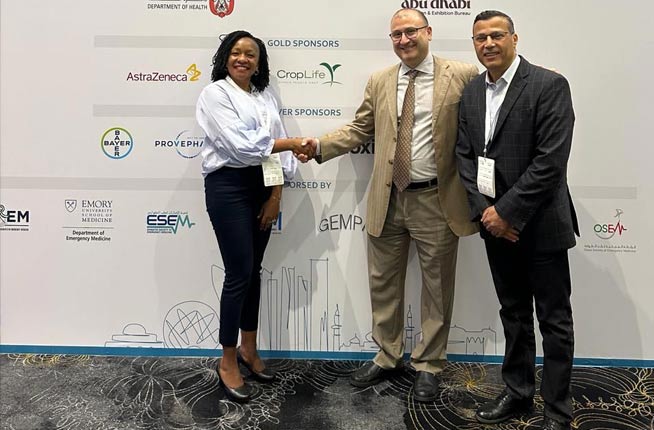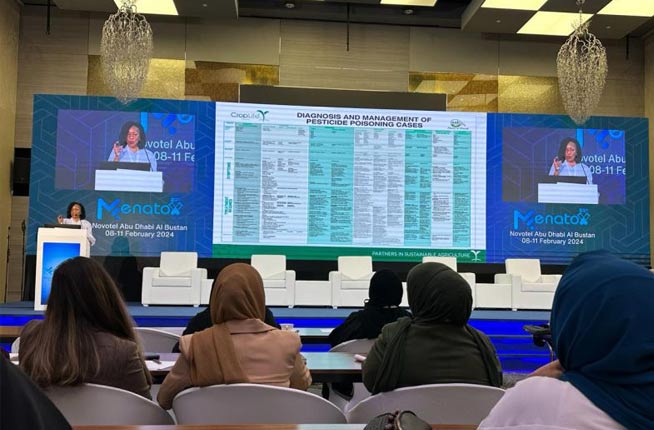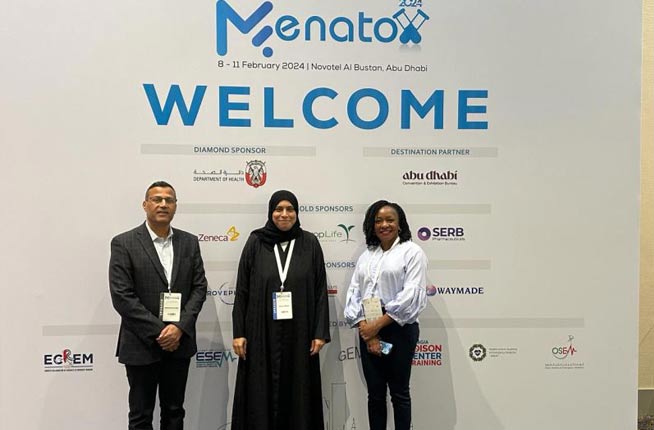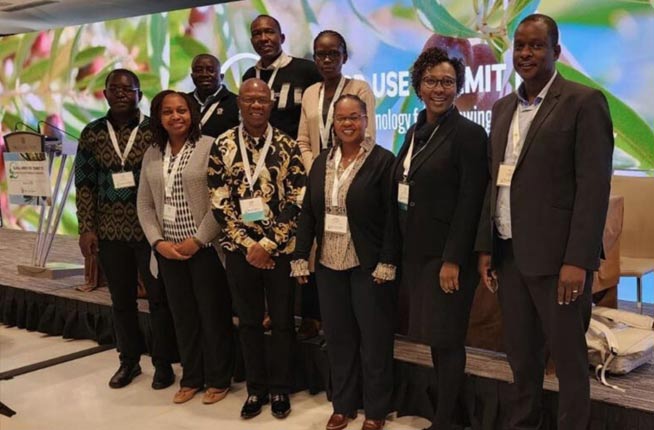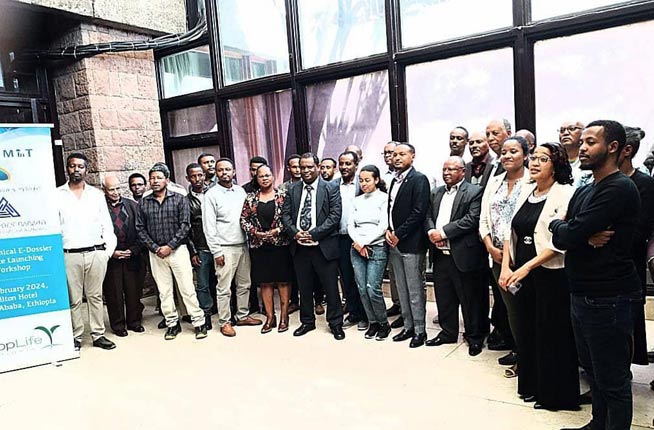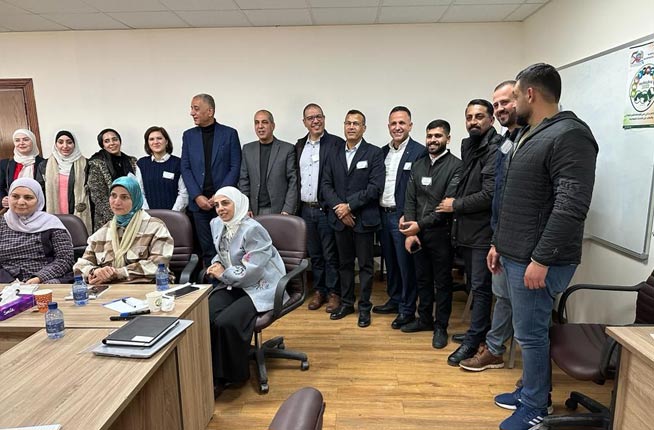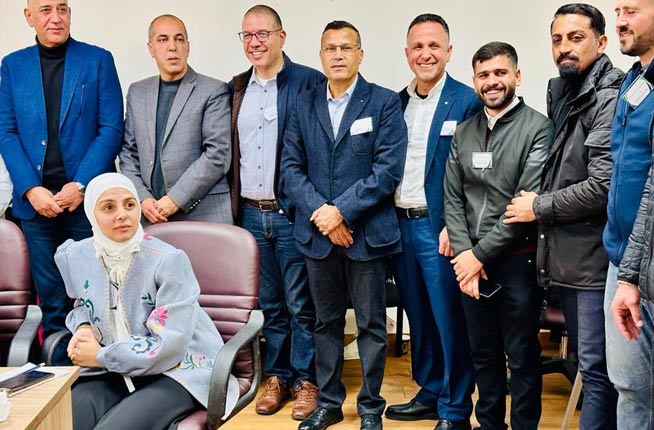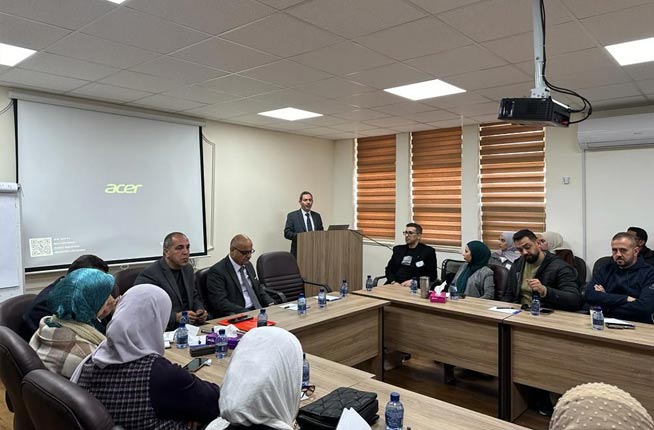Last week, CropLife AME colleagues attended the annual scientific meeting and conference organised by the Middle East and North Africa Clinical Toxicology Association (MENATOX Conference), in Abu Dhabi, United Arab Emirates. MENATOX aims to facilitate communication between all its members, promote collaborations that advance the care of poisoned patients, and establish meaningful research endeavours to achieve self-sustainability and better plan health care delivery. Evelyn Lusenaka, CL AME Stewardship Director, notably provided a presentation on Pesticides Primer for Clinical Toxicologists and Public Health Professionals: Proper Selection, Characteristics, and Safe Applications. The presentation provided the audience with a better understanding of pesticides, risks and hazards and responsible use. In addition to the presentation, CL AME held a side event titled The Roles of Poison Information Centres in the LMICs and EMRO Countries in Safe Management of Pesticides. Key outcomes from the presentation and side event were that CL AME needs to work closely to share information on pesticides with the clinical toxicologists. There is also a need to develop a database of the active ingredients and a guide on how the clinicians can manage incidences of poisoning. In addition, CLAME will work closely with MENATOX to build capacity of the poison information centres in data collection. CropLife AME is thriller to announce it has signed a Memorandum of Understanding (MoU) with MENATOX to collaborate in building the capacity of poison information centres across the MENA region in order to share knowledge and data on pesticide poisonings to augment stewardship activities in hotspot areas. The event was a great opportunity to share best practices on how as CL AME we work towards reducing the numbers of poisoning cases related to pesticides and to learn from experts in the field of clinical toxicology and public health research. The use of crop protection and biotechnology products is essential for maintaining and increasing agricultural productivity and improving farmer livelihoods on the African continent. However, this must be achieved with minimum risk to human health and the environment. To achieve this CropLife Africa Middle East, along with its member companies and associations, actively develops and promotes stewardship programs across the region. The industry recognises that effective stewardship is crucial for doing business in Africa and that it is especially important in low-income countries where regulatory enforcement may lack effectiveness.
CropLife AME took part in the Global Summit on Minor Uses in Madrid, Spain, to dialogue with stakeholders about productivity and trade in minor crops.
During the week of 5 February, Stella participated in the Global Summit on Minor Uses in Madrid, Spain. This was an opportunity to dialogue with stakeholders on potential solutions regarding the many challenges that negatively impact productivity and trade in minor crops. CropLife Africa Middle East values working together with various partners on capacity-building projects related to MRLs, consumer safety, and crop grouping. We welcome the next steps related to accelerating innovation by our members in providing technological solutions and enhancing MRLs knowledge among value chain actors.
CropLife Africa Middle East took part in the launch of an e-submission platform in Ethiopia, Addis Ababa
CropLife Africa Middle East is pleased to take part in the launch of an e-submission platform in Ethiopia. The launch took place on 1st February in Addis Ababa, led by the Ethiopian Agricultural Authority, and participations of CropLife Ethiopia and its members as well as CropLife AME. This is a major milestone in achieving the objective of digitalising the submission of dossiers, making the registration process of new technologies faster and therefore making new tools available to farmers in a quicker way!
Sustainable Pesticide Management Framework: Addressing the intertwined challenges of climate change, sustainable food systems and food security
In recent years, agriculture has gained significant attention during high-level discussions on climate change. The Africa Climate Summit and Africa Food Systems Summit that both took place
early September, and other similar platforms have rightly highlighted the importance of sustainable agricultural practices in mitigating climate change. While Africa has the potential to
feed the world and itself thanks to being the planet’s largest arable land, rising temperatures, extreme weather events, plant pests and diseases, leave millions of Africans experiencing hunger
and malnutrition; according to a UNCTAD’s 2022 report, nearly 60% of the African continent’s population experience food insecurity. Moreover, the alarming rate of inflation exacerbates this
precarious situation, making access to affordable and nutritious food even more challenging. Therefore, within current context of climate change, how to strike the balance between the
urgent need to transition towards sustainable food systems while unleashing Africa’s agricultural potential and therefore ensuring African people can afford three meals a day?
FAO estimates1 that, to satisfy the growing demand driven by population growth and dietary changes, food production will have to increase by 60% by 2050, which can notably be achieved thanks to the use of plant protection products (i.e., pesticides, biopesticides) recognized for their long-term role in sustainable agriculture and in ensuring food safety and food security. As this
must be achieved without jeopardizing our ecosystems or compromising the health and safety of our citizens, it is essential to recognize that the road to sustainable agriculture involves a combination of technological advancements, policy reforms, and collaborative efforts. It is in this context that, so far, CropLife Africa Middle East has launched the Sustainable Pesticide
Management Framework (SPMF) in two significant agricultural countries in the region: Kenya in 2021, and in Morocco in 2022, serving as a vital tool to address these intertwined challenges of
climate change, sustainable food systems and food insecurity. The SPMF is a proactive and longterm engagement over 5 years and for which over 13$ million dollars are being invested by the
industry. The core ambition of the SPMF is to protect human health, safeguard the environment and optimize agricultural productivity. It is based on three pillars: reducing reliance on Highly
Hazardous Pesticides 2 ; increasing innovation; ensuring responsible and effective use of plant protection solutions.
I am very proud to note that, both in Kenya and Morocco, the SPMF has already demonstrated changes, notably with regards to the fast-tracking adoption of low-risk products, the introduction of innovations within agriculture, and – via training programs and workshops -, the empowerment of farmers with the necessary skills and knowledge to adopt sustainable farming practices. The successful implementation of SPMF so far is possible, notably thanks to two key ingredients: the localization of the SPMF – as Africa’s agricultural systems vary significantly from a region to another, it is therefore imperative that any green transition strategies is adapted to local contexts -, and the collaborative approach. Indeed, coordinated efforts with key stakeholders along the food supply chain is key, and by working together – from farmers, researchers, policymakers, and other decision-makers – we can create a sustainable and resilient agricultural sector that not only increases productivity but also safeguards the well-being of our communities and environment. Still, a lot remains to be done. Moving forward, and in anticipation of COP28, it is important to recall that:
As we cannot afford to delay action, let us seize this opportunity to strengthen collaboration, drive meaningful change, and make a lasting impact on the future of agriculture in Africa.
By Jerome Barbaron, President of CropLife Africa Middle East
CL AME MENA Regional Director, organized a Training of Trainers of Government Officers and Companies in Amman, Jordan.
In December, CL AME MENA Regional Director, organized a Training of Trainers of Government Officers and Companies in Amman, Jordan. The topics addressed were notably the classification of pests and diseases, Pest Management, IPM and Pest monitoring, Pesticide Classification, Pesticides regulation, registration, and monitoring in Jordan, understanding Counterfeit and illegal pesticides and consequences, Pesticide Resistance management and their causes. The training was attended by 15 (private companies) and 24 (Extension services and plant protection and phytosanitary section). Education is key as it is the seed that grows into a bountiful harvest, and through diverse programs, CL AME contributes to knowledge sharing and education.

